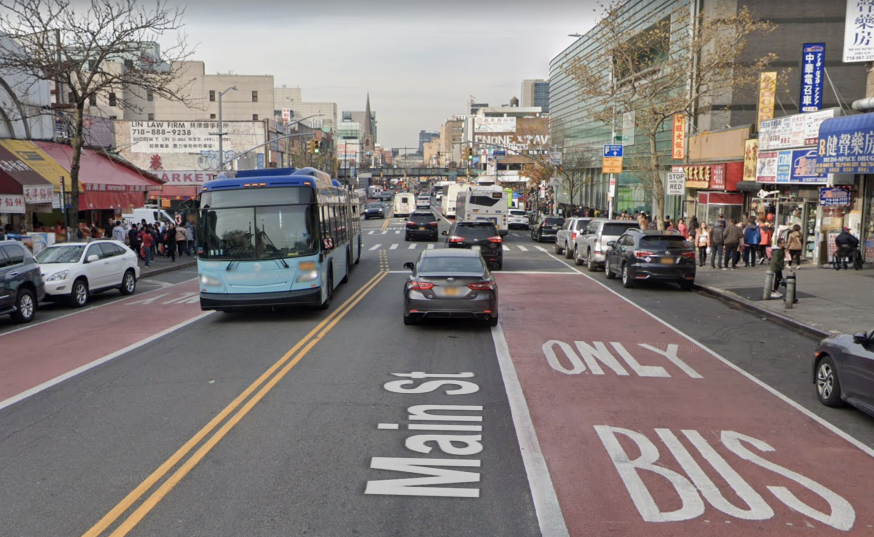
A stretch of Main Street in Flushing will be made into a busway this month (Google Maps)
June 8, 2020 By Allie Griffin
The Department of Transportation (DOT) will create four new bus lanes and five new busways throughout the city in the next few months — with the first to begin construction this month in Queens, Mayor Bill de Blasio announced today.
A .3-mile northbound stretch of Main Street in Flushing will be converted to a bus-and-truck-only road or “busway” from Sanford Ave to Northern Boulevard this month.
It will be similar to the 14th Street busway in Manhattan — where buses, trucks and emergency vehicles have almost exclusive use of the stretch each day.
Cars are almost entirely prohibited from driving along the 14th Street busway from 6 a.m. to 10 p.m. daily. Drivers are allowed to travel a block or two to make deliveries and pick up or drop off passengers and then must make the next available right turn off the busway.
The 14th Street busway has increased bus speeds by as much as 24 percent and ridership by as much as 30 percent, according to the DOT.
De Blasio announced today that the 14th Street busway is now permanent. He also revealed 20 miles of new busways and bus lanes that will be launching between this month and October.
The Main Street busway will launch this month. Jamaica Avenue between Sutphin Boulevard and 168th Street will also be converted into a nearly mile-long busway at a later date.
The announcement came as New York City begins reopening today and an estimated 200,000 to 400,000 people are returning to work.
“As New York City emerges from the difficult days of COVID-19, our commitment to faster and more reliable bus service has never been more important, as buses serve a critical role — both in communities hit hard from the pandemic and by essential front-line workers,” DOT Commissioner Polly Trottenberg said in a statement.
Each busway will run as a trial for one year. When the year is up, the city will decide whether to make the busways permanent depending on the success of each.
The DOT will also create a 6.4 mile bus lane along Merrick Boulevard, from Hillside Avenue to Springfield Boulevard, in August.
“These 20 new miles of busways and lanes ways are going to help over three quarters of a million New Yorkers to get around more easily,” de Blasio said. “750,000 New Yorkers will have a faster way to work, more frequent service, less crowding.”
The bus lanes and busways will speed up service and create more frequent buses to prevent overcrowding on buses — which could spread COVID-19.
“More service equals less crowding equals more health and safety — that’s what we want to achieve,” the mayor added.
One Comment

You need more than a bus lane on Main Street in Flushing to help solve the problem. There was seed money in the previous MTA $32 billion 2015 – 2019 Capital Plan to look into restoring the long forgotten Flushing Bus Terminal, which closed in 1954. To date, there is no indication that these dollars have been spent. This need has been previously documented in planning studies going back to the 1960’s. Construction of a Flushing intermodal bus terminal could facilitate a smoother transfer between bus and subway. In the early 1960’s Flushing Municipal Parking Lot 1 was thought of for construction of an intermodal bus terminal. This facility would take hundreds of buses off the surrounding streets, where they discharge and pick up riders. For 56 years, generations of public officials, on a bipartisan basis, have failed to secure any funding necessary to support environmental review, design, engineering and construction of this badly needed transportation improvement.
From the 1960s to today, there has been an explosion in the number of commuters riding buses to Flushing and transferring to the subway. This has been complimented by a huge growth of commercial businesses accompanied by the demolition of homes to support construction of apartment houses and multi family homes in the surrounding neighborhood. Just walk in any direction from the corner of Main Street and Roosevelt Avenue in downtown Flushing and see for yourself. Buses traveling to, from and thru downtown Flushing move at slow speeds due to excess traffic not only during rush hour but also off peak. This results in a longer commute for riders and periodic bunching of buses on many routes.
Construction of a climate controlled intermodal bus terminal could assist in improving traffic and pedestrian circulation in and around the intersection of Main Street and Roosevelt Avenue along with the rest of downtown Flushing. Over 60,000 rush hour #7 subway riders and thousands more off peak would be protected from heat, cold, rain, snow and winds. There could be a smoother transfer between the bus and subway.
How disappointing that no elected official has ever stepped forward to honor this commitment from decades ago. Diogenes is still looking for any MTA board member or public official to add this project to the MTA $51 billion 2020 – 2024 Capital Plan.
In the interim, a short term improvement could be construction of bus holding lights at bus stops. This would assist riders transferring from subway to bus when a train arrives several minutes after scheduled bus departures. Missing a bus by a minute or two during off peak hours (when buses operate with longer intervals) is frustrating to riders. Why not also invest in installation of bus holding lights at other major bus to subway transfer connections as well?
(Larry Penner — transportation advocate, historian and writer who previously worked 31 years for the Federal Transit Administration Region 2 New York Office. This included the development, review, approval and oversight for billions in capital projects and programs for the MTA, NYC Transit, Long Island and Metro North Rail Roads, MTA Bus, NYC Department of Transportation along with 30 other transit agencies in NY & NJ)